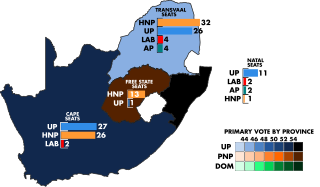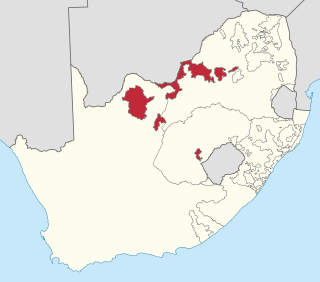Related Research Articles

The Truth and Reconciliation Commission (TRC) was a court-like restorative justice body assembled in South Africa in 1996 after the end of apartheid. Authorised by Nelson Mandela and chaired by Desmond Tutu, the commission invited witnesses who were identified as victims of gross human rights violations to give statements about their experiences, and selected some for public hearings. Perpetrators of violence could also give testimony and request amnesty from both civil and criminal prosecution.

Afrikaner Calvinism is a cultural and religious development among Afrikaners that combined elements of seventeenth-century Calvinist doctrine with a "chosen people" ideology based in the Bible. It had origins in ideas espoused in the Old Testament of the Jews as the chosen people.

The Day of Reconciliation is a public holiday in South Africa held annually on 16 December. The holiday came into effect in 1995 after the end of apartheid, with the intention of fostering reconciliation and national unity for the country. Recognising the need for racial harmony, the government chose the date for its significance to both Afrikaner and indigenous South African cultures. The celebration of the Day of Reconciliation can take the form of remembering past history, recognising veteran's contributions, marching, and other festivities.

The Afrikaner Weerstandsbeweging, commonly known by its abbreviation AWB, is an Afrikaner nationalist, white supremacist, and neo-Nazi political party in South Africa. Since its founding in 1973 by Eugène Terre'Blanche and six other far-right Afrikaners, it has been dedicated to secessionist Afrikaner nationalism and the creation of an independent Boer-Afrikaner republic or "Volkstaat/Boerestaat" in part of South Africa. During bilateral negotiations to end apartheid in the early 1990s, the organisation terrorised and killed black South Africans.

Eugène Ney Terre'Blanche was an Afrikaner nationalist who founded and led the neo-Nazi Afrikaner Weerstandsbeweging. Prior to founding the AWB, he served as a South African Police officer, was a farmer, and was an unsuccessful Herstigte Nasionale Party candidate for local office in the Transvaal. He was a major figure in the right-wing backlash against the collapse of apartheid. His beliefs and philosophy have continued to be influential amongst white supremacists in South Africa and across the world.

Orania is a Afrikaner nationalist town in South Africa, founded by Afrikaners. A de facto white-only separatist micronation, it is located along the Orange River in the Karoo region of the Northern Cape province. The town is split in two halves by the R369 road, and is 871 kilometres (541 mi) from Cape Town and approximately 680 kilometres (420 mi) from Pretoria. Its climate is semi-arid. The town uses its own currency, the Ora, and doesn’t allow non-Afrikaner people to live or work in it.

Christiaan Frederick Beyers Naudé was a South African Afrikaner Calvinist Dominee, theologian and the leading Afrikaner anti-apartheid activist. He was known simply as Beyers Naudé, or more colloquially, Oom Bey.

A Volkstaat, also called a Boerestaat, is a proposed White homeland for Afrikaners within the borders of South Africa, most commonly proposed as a fully independent Boer/Afrikaner nation. The proposed state would exclude Afrikaans-speaking Coloureds but accept South Africans of English ancestry and other White South Africans, if they accept Afrikaner culture and customs.

General elections were held in South Africa on 26 May 1948. They represented a turning point in the country's history, as despite receiving just under half of the votes cast, the United Party and its leader, incumbent Prime Minister Jan Smuts, were ousted by the Herenigde Nasionale Party (HNP) led by D. F. Malan, a Dutch Reformed cleric.
The Battle of Ventersdorp was a violent confrontation on 9 August 1991 in the South African town of Ventersdorp between supporters of the far-right Afrikaner Weerstandsbeweging (AWB) and the South African Police and security forces. Though technically not a "battle", it became known as such in the media while official sources such as the Truth and Reconciliation Commission (TRC) simply refer to it as an "incident". Much of its notoriety lies in the fact that it marked the first occasion the South African security forces used lethal force against right-wing white protesters since the National Party's ascension to power in 1948.
Afrikaner nationalism is an ethnic nationalistic political ideology created by Afrikaners residing in Southern Africa during the Victorian era. The ideology was developed in response to the significant events in Afrikaner history such as the Great Trek, the First and Second Boer Wars and the resulting anti-British sentiment and Anti-communism that developed among Afrikaners and opposition to South Africa's entry into World War I.

The Durban International Film Festival (DIFF) is an annual film festival that takes place in Durban, KwaZulu-Natal province, South Africa. It was founded in 1979 by Teddy Sarkin and Ros Sarkin. Presented by Centre for Creative Arts at the University of Kwazulu-Natal, it is the oldest and largest film festival in Africa and presents over 200 screenings celebrating the best in South African, African and international cinema. Most of the screenings are either African or South African premieres. The festival also offers filmmaker workshops, industry seminars, discussion forums, and outreach activities that include screenings in township areas where cinemas are non-existent, and much more, including Talent Campus Durban and a Durban FilmMart co-production market.

The 1994 Bophuthatswana crisis was a major political crisis which began after Lucas Mangope, the president of Bophuthatswana, a nominally independent South African bantustan created under apartheid, attempted to crush widespread labour unrest and popular demonstrations demanding the incorporation of the territory into South Africa pending non-racial elections later that year. Violent protests immediately broke out following President Mangope's announcement on 7 March that Bophuthatswana would boycott the South African general elections. This was escalated by the arrival of right-wing Afrikaner militias seeking to preserve the Mangope government. The predominantly black Bophuthatswana Defence Force and police refused to cooperate with the white extremists and mutinied, then forced the Afrikaner militias to leave Bophuthatswana. The South African military entered Bophuthatswana and restored order on 12 March.

Many people of European heritage in South Africa are descended from Huguenots. Most of these originally settled in the Cape Colony, but were absorbed into the Afrikaner and Afrikaans-speaking population, because they had religious similarities to the Dutch colonists.
Vereniging van Oranjewerkers is a South African white separatist political movement that seeks a homeland for Afrikaners.

It is thought that multiple ethnic groups in South Africa have long-standing beliefs concerning gender roles, and most are based on the premise that women in South Africa are less important, or less deserving of power, than men. Some view African traditional social organizations as male centered and male dominated. One prevailing caricature of Afrikaner religious beliefs includes a strong emphasis on the theoretically biblically based notion that women's contributions to society should normally be approved by, or be on behalf of, men. Claims are even made of modern sexism and Christianity being introduced into South Africa by the ancestors of the Afrikaner diaspora.
Afrikaners are a Southern African ethnic group descended from predominantly Dutch settlers first arriving at the Cape of Good Hope in 1652. Until 1994, they dominated South Africa's politics as well as the country's commercial agricultural sector.
The White Liberation Movement was a South African neo-Nazi organisation which became infamous after being banned under the Apartheid regime, the first right-wing organisation to be so banned. It regarded itself as the most far-right organisation in South Africa.
The Dakar Conference was a historic conference between members of the Institute for Democratic Alternatives in South Africa (IDASA) and the African National Congress (ANC). It was held in Dakar, Senegal between 9 and 12 July 1987. The conference discussed topics such as strategies for bringing fundamental change in South Africa, national unity, structures of the government and the future of the economy in a free South Africa. The IDASA delegation from South Africa, participated in the conference in their private capacity and would later be condemned by the South African government for meeting a banned organization. The future indirect result of the conference was South African government talks with Nelson Mandela and his eventual meeting with P. W. Botha in 1989.
The Institute for Democratic Alternatives in South Africa (IDASA) later known as the Institute for Democracy in South Africa was a South African-based think-tank organisation that was formed in 1986 by Frederik van Zyl Slabbert and Alex Boraine. Its initial focus from 1987 was creating an environment for white South Africans to talk to the banned liberation movement in-exile, the African National Congress (ANC) prior to its unbanning in 1990 by the President F. W. de Klerk. After the South African election in 1994, its focus was on ensuing the establishment of democratic institutions in the country, political transparency and good governance. Caught up in a funding crisis after the Great Recession, it closed in 2013.
References
- ↑ Carrots and sticks: the TRC and the South African amnesty process. Jeremy Sarkin, Jeremy Sarkin-Hughes. Intersentia nv, 2004. ISBN 90-5095-400-6, ISBN 978-90-5095-400-6. Pg 289.
